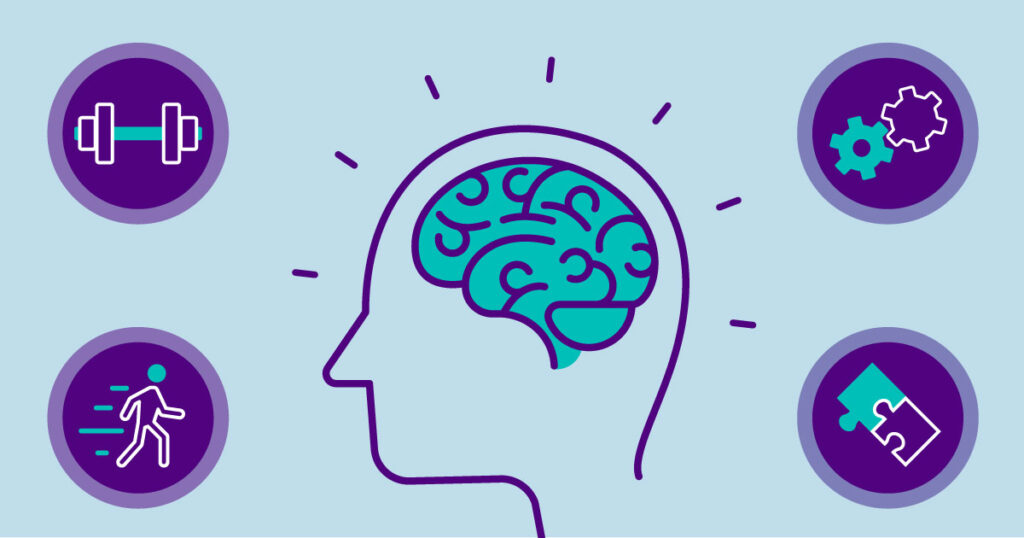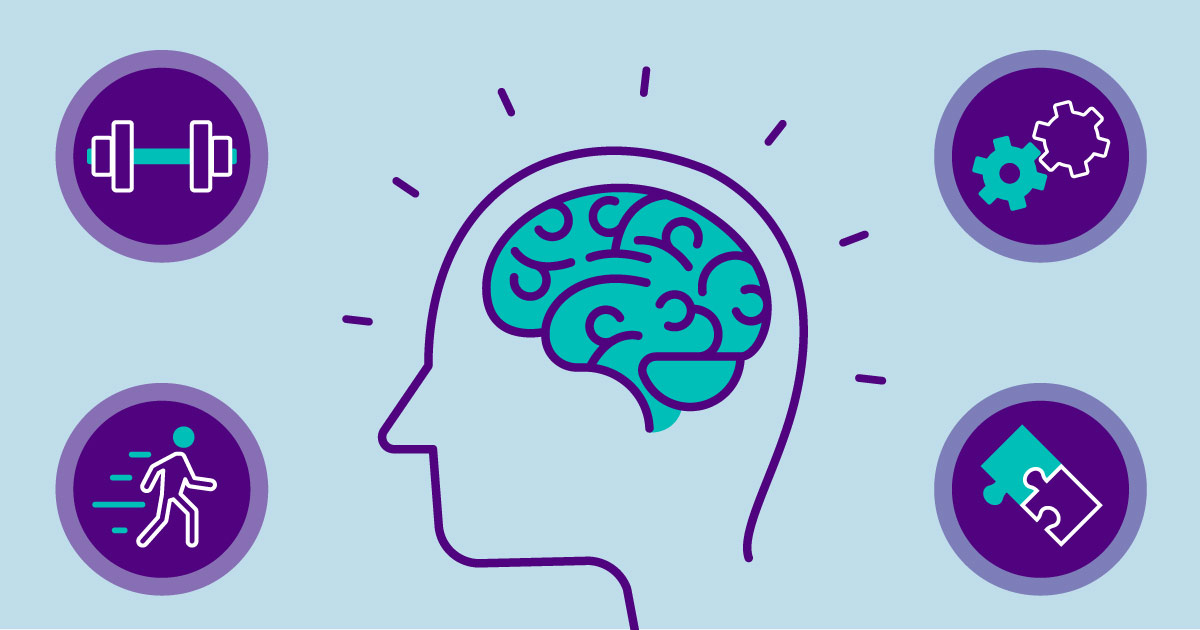It is normal to experience changes in your brain as you age. Your memory might not work as well as it once did, and you may need more time to learn a new task.
As you age, your brain actually decreases in size. This can cause a decrease of blood flow, less effective communication between neurons and an increase in inflammation, according to the National Institute on Aging. These structural changes are normal but they don’t necessarily mean you will experience cognitive decline.
Lifting weights and staying active helps keep your muscles strong and flexible, but your brain can’t go for a run or pick up a dumbbell. Considering mental fitness is often as important as physical fitness, there are many things you can do to keep your brain sharp as you age.

Manage your physical health to keep your brain sharp as you age
A healthy body is the perfect environment for a healthy brain.
As you age, it is important to schedule regular health screenings and manage all chronic conditions such as high blood pressure or high cholesterol. Ask questions about any medications you may be taking as they may have an impact on your memory or mood.
Other ways you can keep up with your physical health that have a positive impact on brain function include avoiding alcohol and smoking. And be sure you are aiming to get 7-9 hours of sleep every night so your brain has enough time to recharge and flush out toxins.
Exercise your body and see the benefits of brain sharpness
As mentioned, aging decreases blood flow to the brain and increases inflammation. Exercise can counter these effects. As your heart rate increases, more oxygen makes its way to the brain, creating a healthier environment for brain cells to grow and make neural connections.
Exercise might get you thinking more quickly and clearly while reducing your risk of dementia. One study from Preventive Medicine found that those who didn’t exercise on a regular basis were almost twice as likely to experience severe cognitive decline and dementia as compared to those who lived an active lifestyle.
It can feel more difficult to exercise as you age and you might not be able to do the same physical activities as you did in your youth. The Centers for Disease Control and Prevention (CDC) suggests adults need 150 total minutes of moderate-intensity exercise each week. Achieving that, even if it means splitting it up into small chunks throughout your day, will help keep your brain sharp as you age.
If you want to boost your brain health even further, try an activity that gets your heart rate up while presenting a cognitive challenge. Examples include tennis, dance or yoga. *
*Always consult your physician before beginning a new exercise routine.
Keep learning
Stimulating activities such as crosswords, brain games and jigsaw puzzles won’t prevent Alzheimer’s disease or cognitive decline, but they can make your brain sharper, your life easier and your days more enjoyable.
Brain games stretch and flex your cognition and executive function. This may make it easier to understand, remember and complete tasks. Learning a new skill such as a language or hobby may also improve your thinking ability overall and keep your brain sharp as you age.
Some brain-stimulating activities you can try include:
- Model building
- Knitting or quilting
- Card games
- Creative writing
- Taking a class at your community center
- Video and computer games
Stay connected to your social circles
Connecting with your community doesn’t just add social value to your life, it actually improves your brain health. Social isolation has been proven to increase one’s dementia risk by 50%, making those who stay connected to their communities less likely to experience cognitive decline.
Additionally, engaging in social activities helps keep your life feeling meaningful and productive, even as you age. Social connection is the proven fix to social isolation, contributing to better overall health and wellbeing.
A few activities you can participate in to stay socially connected include:
- Spending time with family and friends and nurturing those relationships
- Volunteering for an organization in your community and finding ways to serve others
- Joining a hobby-focused group such as a walking group or bird watching club
- Visiting your local senior center or public library and finding programs that interest you
- Connecting with online support groups about topics or situations that relate to your stage of life
Eat a healthy diet to keep your brain sharp as you age
Countless studies show that a healthy diet supports healthy brain development and positive moods. Although there isn’t a one-size-fits-all diet that guarantees healthy brain development, adding nutrient-rich foods where you are able can support your brain health.
The main nutrients that support a healthy brain include omega-3 fatty acids, folates, iron, magnesium, zinc and vitamins A, B and C. These nutrients are mostly found in:
- Nuts and seeds
- Legumes
- Grains
- Dairy
- Fatty fish
- Proteins
- Fruits
- Vegetables
To see a comprehensive list of specific foods that support a healthy brain, click here. *
* Please consult your physician before making any big changes to your diet or lifestyle.
Learn how to reduce and control stress to keep your brain sharp as you age
Although everyone experiences stress throughout their lives, learning how to reduce and control it is key to helping keep your brain sharp as you age.
The brain is the central organ that receives and responds to stressors. A large amount of stress negatively affects your brain function. It can hinder your cognition, impede your decision-making abilities and cause more anxiety and negative moods.
A brain that is stuck in stress mode is less able to adapt to situations and bounce back from the stressful state. This perpetuates the negative effects that stress has on the brain, making them last longer than whatever event caused the stress in the first place.
When you learn to reduce and control stress, it increases the resiliency of the brain, allowing it to break free of stress cycles and move past stressful situations with ease.
Reducing stress is a continual practice of healthy activities mentioned in this article like eating well, exercising, connecting with others and staying on top of your physical health. However, adding in mindfulness exercises such as meditation and deep breathing may help you reduce or control your stress.
Other activities that might help control your stress include:
- Journaling to release your thoughts and feelings
- Laughing by way of a funny video or with friends or family
- Listening to music to distract the mind
- Exercising your creativity through gardening, sewing, reading or drawing
- Getting professional help for your stress if you persistently feel overwhelmed
Social Share
At Enhabit our patients are our number one priority. From providing the latest medical practices to building deep personal connections, we’re focused on upholding every patient’s dignity, humanity and sense of control on their health care journey.
Home health
Our home health services give patients access to the care they deserve in the comfort of their own homes. From disease and injury management to recovery from surgery, our clinicians help patients confidently achieve their healthcare goals.
Hospice care
Our hospice care services place importance on the comfort of every patient living with a terminal illness. Our caring professionals are dedicated to providing not just physical care, but spiritual and emotional support to every patient and their loved ones.






